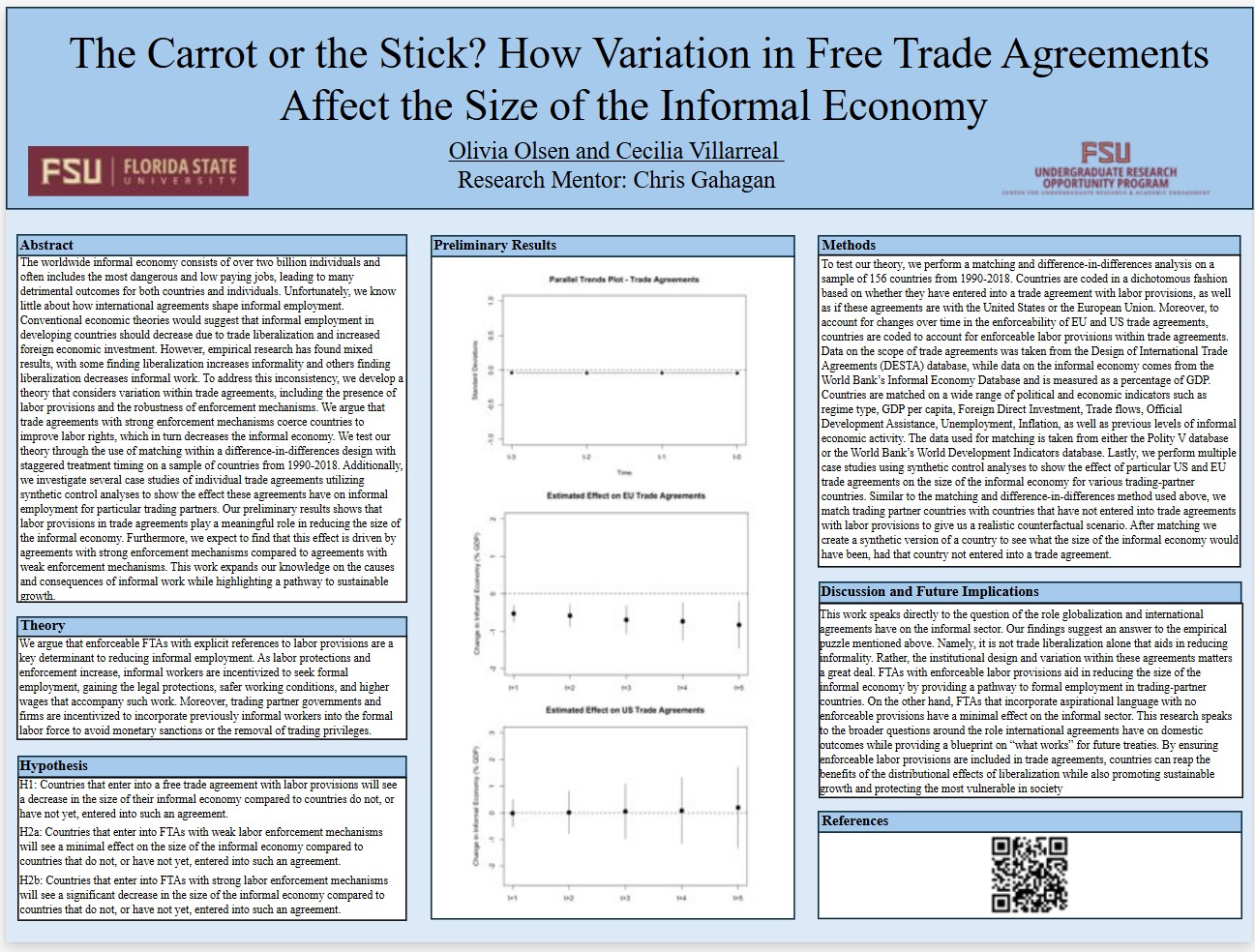Research Symposium
25th annual Undergraduate Research Symposium, April 1, 2025
Cecilia Villarreal Poster Session 4: 3:00 pm - 4:00 pm/ Poster #190

BIO
Cecilia Villarreal is an undergraduate student majoring in Economics at Florida State University. Originally from Fort Myers, Florida, she has a strong interest in behavioral economics, markets, and investment analysis. She has completed two research projects with the College of Social Science and Public Policy, focusing on labor provisions in the informal economy and monetary incentives in behavioral economics. Beyond research, Cecilia is interested in the intersection of economics and finance, particularly how market incentives drive decision-making. She plans to apply her analytical skills from her research and studies to economic forecasting, market analysis, and financial strategy development.
Outside of academics, Cecilia is involved in organizations that promote political discourse, civic engagement, and community outreach. She enjoys discussing policy issues, analyzing economic and political perspectives, and fostering productive dialogue on complex topics. Through these experiences, she hones her ability to debate and critically evaluate diverse viewpoints, deepening her understanding of how economic policies shape society. Her work in voter education initiatives and community outreach reinforces her commitment to bridging the gap between economic theory and real world policymaking, preparing her to apply her knowledge across both the public and private sectors.
The Carrot or the Stick? How Variation in Free Trade Agreements Affect the Size of the Informal Economy
Authors: Cecilia Villarreal, Christopher GahaganStudent Major: Economics
Mentor: Christopher Gahagan
Mentor's Department: Political Science Mentor's College: College of Social Science and Public Policy Co-Presenters: Olivia Olsen
Abstract
The worldwide informal economy consists of over two billion individuals and often includes the most dangerous and low paying jobs, which leads to many detrimental outcomes for both countries and individuals. Unfortunately, we know little about how international agreements shape informal employment. Conventional economic theories suggest that informal employment in developing countries should decrease due to trade liberalization and increased foreign economic investment. However, empirical research has found mixed results, with some finding liberalization increases informality and others finding liberalization decreases informal work . To address this inconsistency, we develop a theory that considers variation within trade agreements, including the presence of labor provisions and the robustness of enforcement mechanisms. We argue that trade agreements with strong enforcement mechanisms coerce countries to improve labor rights, which in turn decreases the informal economy. We test our theory through the use of matching within a difference-in-differences design with staggered treatment timing on a sample of countries from 1990-2018. Additionally, we investigate several case studies of individual trade agreements utilizing synthetic control analyses to show the effect these agreements have on informal employment for particular trading partners. Our preliminary results shows that labor provisions in trade agreements play a meaningful role in reducing the size of the informal economy. Furthermore, we expect to find that this effect is driven by agreements with strong enforcement mechanisms compared to agreements with weak enforcement mechanisms. This work expands our knowledge on the causes and consequences of informal work while highlighting a pathway to sustainable growth.
Keywords: informal economy, free trade agreements, labor provisions, enforcement mechanisms


